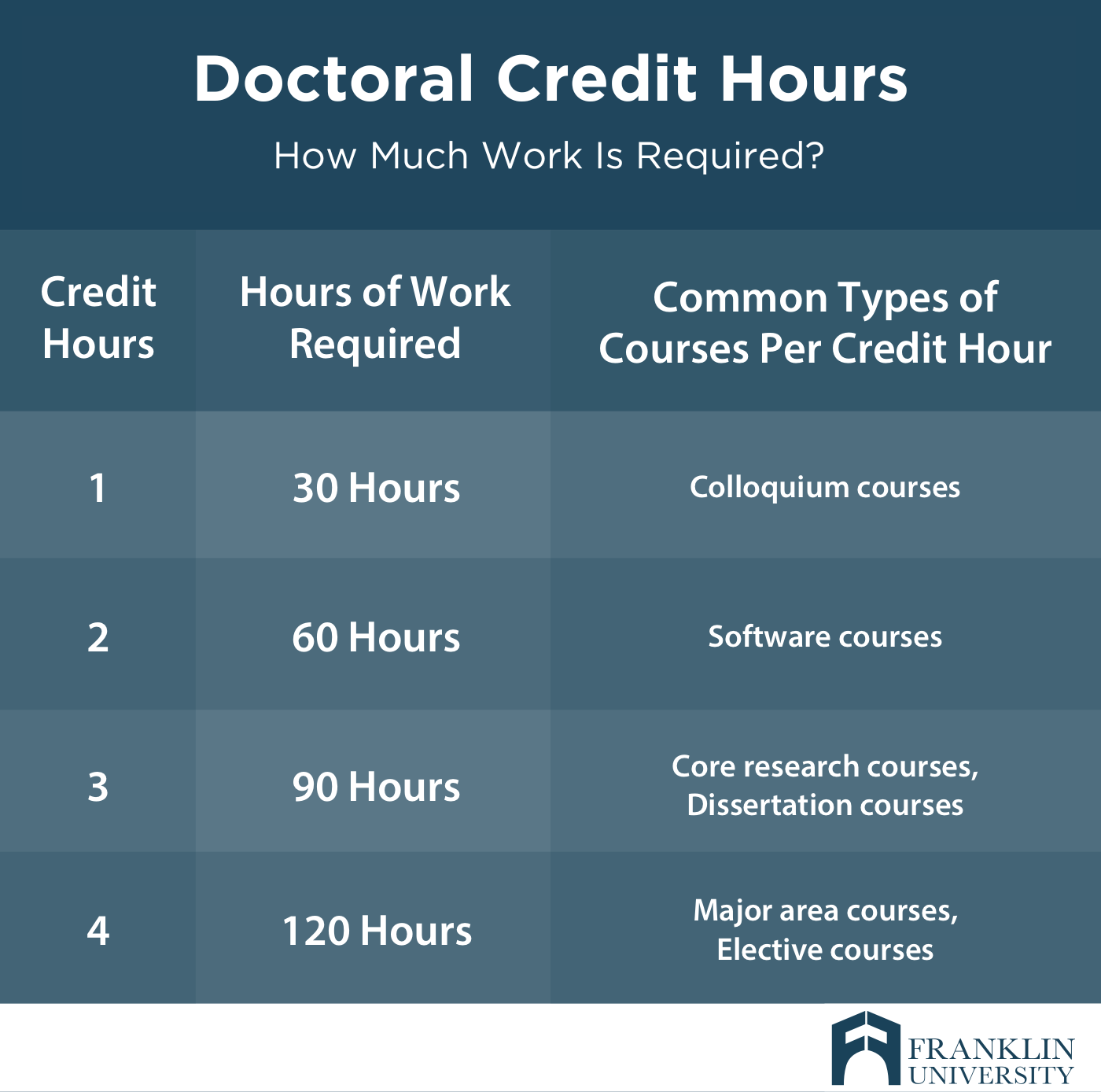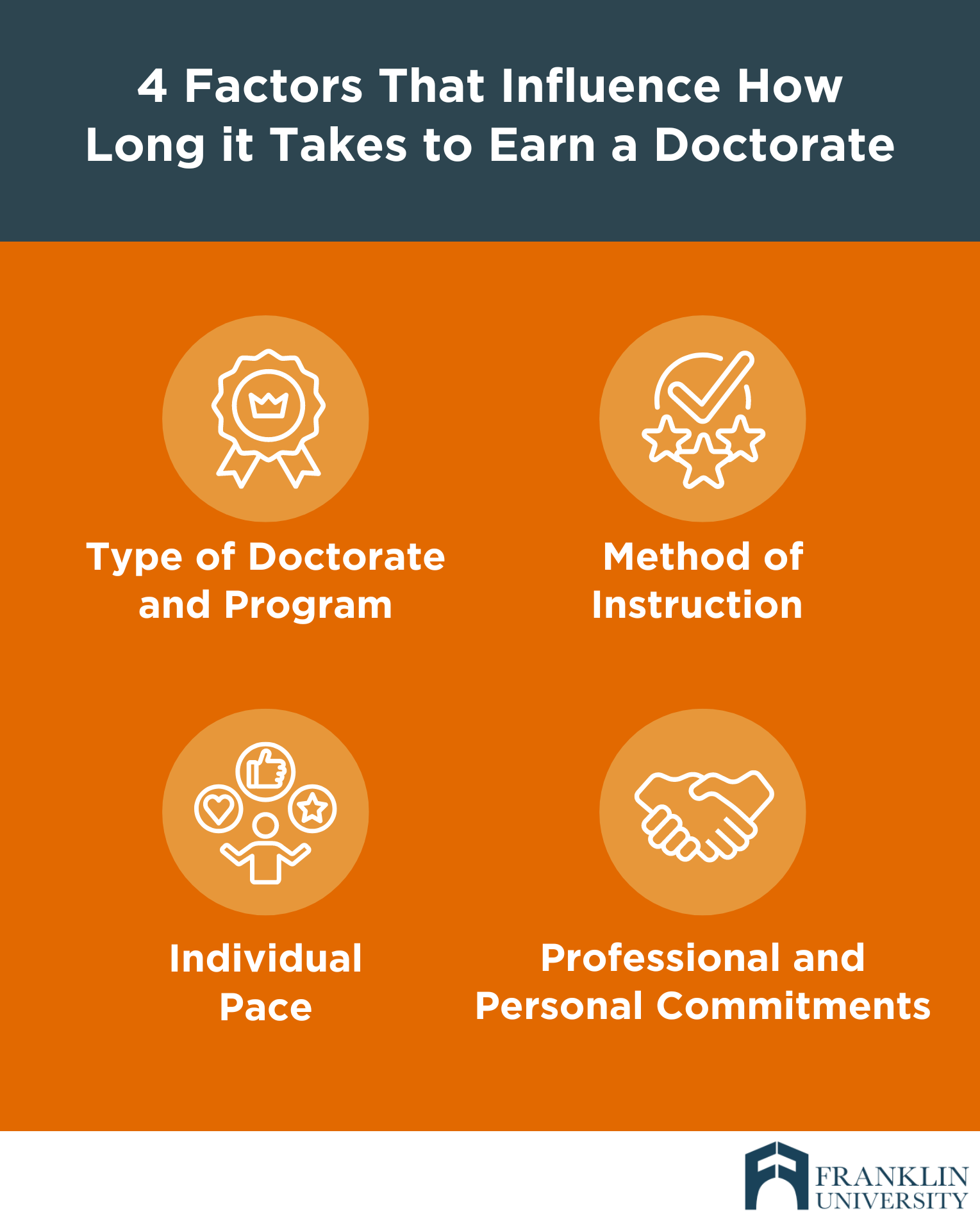Request Information
We're Sorry
There was an unexpected error with the form (your web browser was unable to retrieve some required data from our servers). This kind of error may occur if you have temporarily lost your internet connection. If you're able to verify that your internet connection is stable and the error persists, the Franklin University Help Desk is available to assist you at helpdesk@franklin.edu, 614.947.6682 (local), or 1.866.435.7006 (toll free).
Just a moment while we process your submission.

How Many Credit Hours Does It Take to Get a Doctorate Degree?
When it comes to being top of your field, there’s nothing quite like earning a doctorate degree. Whether you want to advance your career to the pinnacle or teach at the college or university level, a doctorate degree is a must.
As you think about enrolling in a doctoral program, you may be wondering how many credits are required for a doctorate degree. More importantly, you may want to know what you can do to earn your doctorate even faster.
This guide can help you better understand credit hours so you can figure out how long it will take to earn your doctorate degree. This includes how credit hours vary by doctoral program, who determines doctoral credit requirements and how to calculate your own credit hours.
How Many Credit Hours Should a Doctoral Program Have?
Because credit hour requirements vary by program, there is no set-in-stone rule for the number of credits required to earn a doctorate. In general, you can expect credit hour requirements to be anywhere from 60 to 120.
Why such a wide range? A lot of reasons, including degree type, area of study, institutional requirements and regional and state mandates. Here’s a closer look at each.
Degree Type
From a traditional Ph.D. to an applied doctorate, the type of degree you earn has everything to do with how many credit hours you’ll need to graduate. In general, you can expect a Ph.D. program to require the full 120 hours and an applied doctorate program to require around 60 credit hours.
Area of Study
What you choose to study has a really big impact on how many hours you need to earn your doctorate. Some subjects, including the hard sciences and humanities, require fewer credit hours whereas some fields, such as psychology, require more. Don’t just assume all programs are the same. Ask about the specific program you’re thinking of enrolling in so you know for sure just how many credit hours are needed.
Institutional Requirements
Every university determines its own curriculum as well as the number of credit hours awarded for each class, and the total number of credit hours required to complete each program. Even if you’re earning a degree that someone else is earning, but at a different school, you could be required to have more or less credits because that number is based on the structure of the program.
Regional and State Mandates
High-quality universities are governed by both regional and state accrediting bodies, which determine the minimum number of credit hours required to earn a doctorate. The State of Ohio, for example, requires students to earn at least 60 credit hours beyond their bachelor’s degree credits. Again, you’ll want to ask about your specific program at the university of your choice.
How Are Credit Hours Determined?
Each university determines the number of credit hours associated with a course based on the anticipated time it will take to complete a course. Time includes what’s spent in the classroom on lessons, as well as on research and studying. For most terminal degrees, one course equals 3 to 4 credit hours.
As an example, Franklin University has determined that one credit hour is equal to 30 hours of work (lessons, research, studying). Most of Franklin’s major courses are 4 credit hours. If you do the math (30 x 4), you’ll find that it takes about 120 hours worth of lessons, research and study to complete one course.
Earning a doctorate is challenging and rewarding, but do you know what to really expect? Download this free guide for tips and insights to help you prepare for success.
4 Ways to Earn Credit Hours in a Doctoral Program
There are four fundamental ways to earn credit toward your doctorate.
1. Major and Focus Area Courses
Major courses are foundational to the subject matter of your degree. They focus on providing you with a breadth of information that’s crucial to success in your particular industry.
2. Electives
Electives or focus area courses give you the opportunity to explore areas of specialization or in-depth study within your chosen degree program.
3. Research Core
Your core research courses will teach you how to perform quantitative and secondary research, use common tools and software, and write your dissertation.
4. Dissertation Requirements
Dissertation requirements typically include a comprehensive exam, research and writing, culminating in your dissertation defense.

3 Ways to Get Credit Toward Your Doctorate Degree
Depending on your program or school, here are three ways you could earn credit for what you already know.
1. Master’s Degree or Graduate Study
Your institution may accept some of your master’s degree credit or credits completed at the graduate level. These credits could go toward the total hours you need to earn your doctorate. For example, if your master’s degree required 32 hours to complete, then any master’s level coursework above and beyond those 32 hours might be applied to your doctorate.
2. Transfer Credit
The amount of transfer credit you can use at the doctoral level really depends on the institution. Programs with liberal transfer credit policies, including Franklin University, may allow transfer of up to 29 hours of credit for previously completed doctoral coursework.
3. Experience or Credentials
Some doctoral programs will give you college credit for the coursework taken outside of a degree program to prepare for credentials. For example, you could earn credit toward Franklin’s Doctor of Education (Ed.D.) degree with a PK-12 Educational Leadership Focus for completing coursework toward a superintendent license.
How Long Will it Take to Earn the Credit Hours Needed to Complete a Doctorate Program?
While the number of credit hours for a doctoral program is set in stone, the length of time to graduation is highly dependent on a number of factors. Here’s a look at the four most common.

1. Type of Doctorate and Program
Individual areas of study within the Ph.D. program or professional doctorate play a big part in how long it takes to earn your doctorate. In general, though, you can expect that a Ph.D. program will take a lot longer to complete than a professional doctorate. The average Ph.D. takes 8.2 years to complete, while a professional doctorate can be completed in as few as three years.
2. Method of Instruction
Whether you enroll in an online program, an in-person program, or a blended program that offers both options, the method of instruction has a lot to do with how long it will take to finish your degree
Keep in mind that online programs offer greater flexibility, which, as a full-time student, usually means a faster finish. In-person programs typically take longer to complete. Why? Usually this is because the student is required to complete the individual degree requirements as well as take on the additional responsibilities of teaching and research. Blended programs offer the pros and cons of both methods so the time it takes to finish really depends on preference and availability of time.
3. Individual Pace
If you enroll in a 100% online professional doctorate program as a full-time student (even while you’re working), you can expect to earn your degree in about three years. Compare that with part-time attendance, which would then take you roughly four or five years to finish.
Keep in mind that you’ll need to consider the doctorate program’s “maximum time to completion.” For example, Franklin University’s maximum time to completion for a doctorate program is seven years. Unless you take time off during your program, however, it’s highly unlikely it would take the maximum seven years to finish.
4. Professional and Personal Commitments
One of the best things about attending a college or university with flexibility scheduling is that you can complete your doctorate at your own pace. Because of where you are in your career, you’ll probably want to continue working even while you pursue your doctorate. So, consider your life, work and career situation as you determine the amount of time you’re willing and able to commit to your studies. Just keep in mind that doctorate programs are rigorous. They require a passion and dedication to both continue working and complete your studies. And don’t forget you’ll need to commit to attending your classes, studying, researching, and writing and defending your dissertation. So, consider a program that helps you jumpstart your dissertation so you can finish faster.
Is Faster Better When it Comes to Earning Your Doctorate?
The number of credits required to complete your doctorate and the amount of time it takes to finish isn’t the only consideration when choosing your doctoral program.
Consider the quality of your professional doctorate degree program to see if it aligns with your personal circumstances and professional goals.
Finally, remember, when it comes to investing your time, energy and finances, rather than worrying about how many credit hours you need, focus on finding a quality program with the support you need to finish your doctorate.





